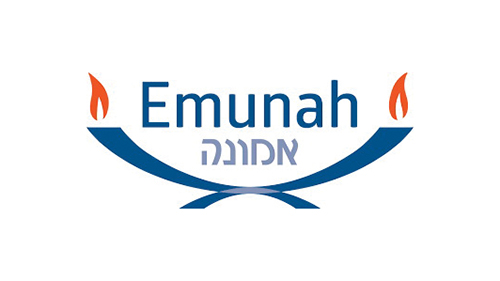
Soon after the horrors that transpired on October 7 began to sink in, it became impossible not to be distressed by the helplessness many of us felt here, while our brethren in Israel were suffering from the most barbaric assault. I desperately wanted to help and when I heard that Emunah of America, an organization I had been associated with for decades, was planning a Mission to Israel in mid-December, it sparked an intense desire in me to join with other like-minded women to bring the Israeli people as much support and encouragement as I could muster.
Just a year earlier, I had participated, along with my daughter and granddaughter, in an Emunah Bat Mitzvah Mission to Israel. The itinerary was perfectly planned, and we had such an amazingly joyful and rewarding experience. I knew that this trip to Israel would be far different. Intrigued by the preliminary itinerary, I also felt compelled to go because the mission was open to men, so I asked my husband, Michael, to join me. Within 48 hours we both signed up with Emunah.
I was often asked if I felt any fear about visiting Israel at that time. I honestly replied that I didn’t. For weeks after the onset of the war, I felt like I was just walking around in a fog. In addition to providing financial support to different organizations and projects, I had a burning desire to be physically present in Israel. I wanted to sit with the families of the hostages or at shiva houses, listen to them, strengthen them and provide some support. I wanted to visit soldiers and express my gratitude to them for protecting our people and our land of Israel.
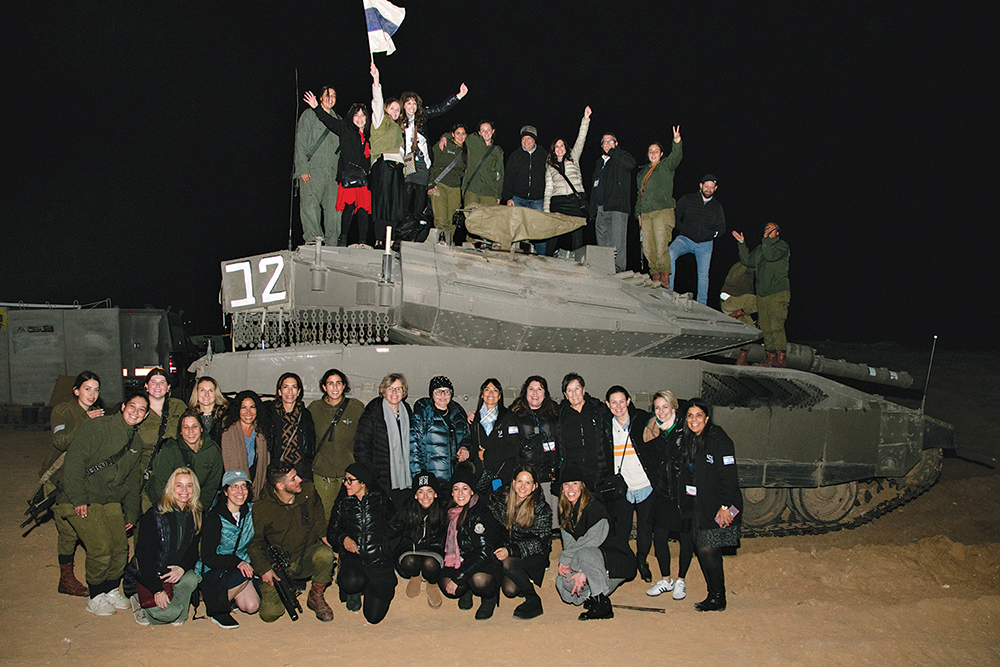
Michael and I arrived at our hotel on a Friday morning, a few days before the mission started. The streets of Yerushalayim were quieter than usual, with less of an American presence on Ben Yehuda Street than we are used to. Our first exposure to the precarious life in Israel occurred that first Friday night, when the very unsettling Tzeva Adom siren blasted, as six missiles were fired from Gaza towards Beit Shemesh and Yerushalayim. We later thankfully found out that three missiles were intercepted and three fell harmlessly in open surrounding areas. Otherwise, Shabbos in Yerushalayim was as beautiful as we had always known it to be.
Day 1: The mission officially started on Monday morning at Har Herzl’s National Cemetery. We began at the Hall of Remembrance. What a heart-wrenching but strangely perfect way to begin this mission. The Hall itself comprises thousands of memorial bricks, where each brick is engraved with the name of a fallen soldier, going back even before the State of Israel was established. With much sorrow, we saw the new bricks that were added since October 7. It reminded us again of the ultimate sacrifice made by so many in the past and unfortunately even in the present, so that Jews worldwide could rely on the ultimate safety that Eretz Yisrael affords us.
We attended the daily Tekes (ceremony) commemorating the Hebrew calendar yahrzeit for any soldier that had fallen. Families of these soldiers are invited to participate in this ceremony. Upon seeing the many young children present, I couldn’t help but wonder how many were there to honor a fallen parent or maybe a fallen grandparent they might never have had the opportunity to meet.
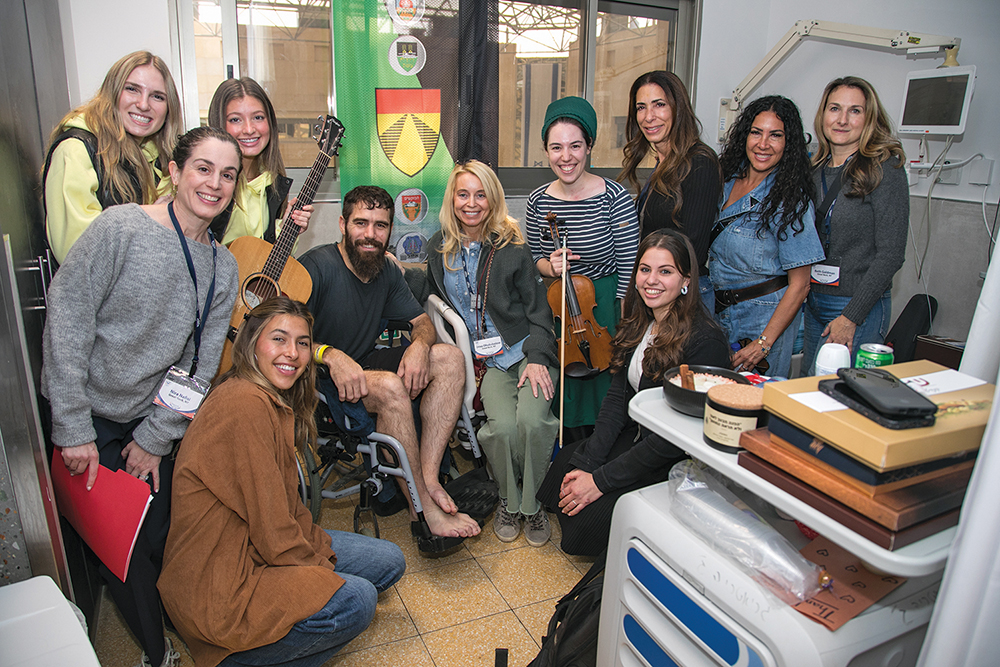
At the conclusion of the ceremony, we left the hall to visit the graves of the fallen heroes of October 7. We saw one woman sitting beside and stroking the gravestone of her 19-year-old son who fell defending his army base on the Gaza border on October 7. We approached her and asked her to tell us about her hero son, Amir Lavi. Rachel, Amir’s mother, shared much about her son’s many talents, and how proud he was to be an Israeli soldier defending Am Yisrael. She told us that as broken as she was, she was not bitter because she knew this was what he wanted to do. To me, being able to speak with her and perhaps bring some nechama (comfort) to a grieving mother at his gravesite was both heartbreaking and moving beyond words.
We continued to our next stop, Mitzpe Dani in the Shomron, where the campus of the Lapidot-Emunah Pre-Military Mechina for Girls is located, practically in the middle of nowhere. The Mechina program accepts religious high school graduates and prepares them spiritually and emotionally for the roles they will undertake in the IDF. There are just a few programs in Israel that prepare girls for military service, and this one motivates the girls to deepen and strengthen their religious and Zionist identities within the IDF framework. We met with some dedicated advisers and instructors, and with the young women enrolled in the program. I found the drive these girls exhibited to be truly inspiring, and their camaraderie for one another very heartwarming.
Later, we had a fascinating briefing by soldiers from the elite unit of Duvdevan, who spoke about the fighting in the West Bank, a front that is not being talked about in the news. Then we volunteered to pack food boxes for soldiers. Once we were instructed on the process, we worked like machines and packed hundreds of boxes. It felt so good to engage in our own small way to assist in the war effort. For dinner, we were joined by a group of b’not sherut serving their National Service in Sderot, sharing their experiences from October 7; they have since been relocated to Yerushalayim and are assisting evacuated families.
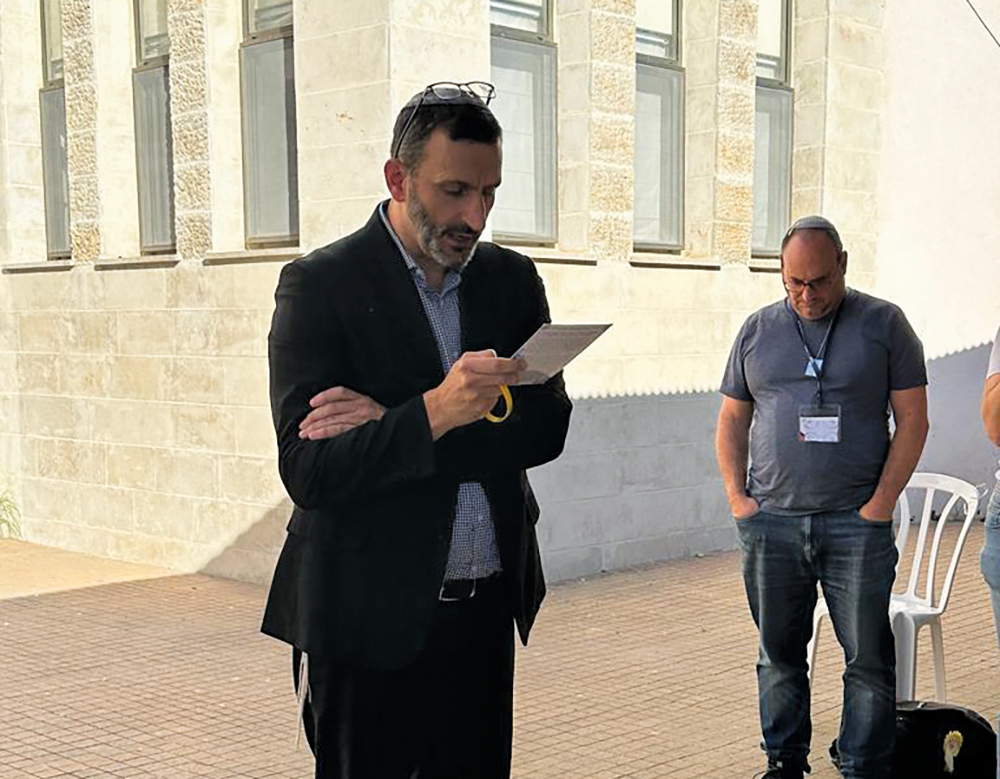
Day 2: We started the second day by heading to Sheba Hospital to visit wounded soldiers and Nova festival attendees. For me, it was certainly a very moving moment, but initially I wasn’t sure what I was going to see and experience. Was I prepared for this? My concern was for naught as the smiles on the injured soldiers we visited quickly made me feel more comfortable. One soldier, with his young wife by his side, had gotten married just one week prior to getting wounded. Another soldier was hit by a bullet fired towards his helmet, which miraculously didn’t pierce it. We brought them cards from kids back at home and other tokens of appreciation. Despite the pain some of the patients were experiencing, they were so appreciative of the visit. On the way out, my husband was enthralled by a visiting hours sign that read the “Hours of Morale Boosting” and “Quiet Hours.” We thought it spoke volumes for how these hero soldiers were being treated.
From Sheba we continued to Yad Binyamin to meet with Rabbi Doron Perez, executive chairman of World Mizrachi. He spoke of his son Daniel, who fought fiercely and bravely against Hamas terrorists in Kibbutz Nahal Oz on October 7. Daniel went missing in action, and it is believed that he and some of his tankmates were abducted into Gaza. Rabbi Perez spoke with remarkable strength about many of his son’s wonderful attributes.
Also, on October 7, Daniel’s older brother, Yonatan, was injured in the battles. He was scheduled to be married two weeks later. With Daniel taken hostage, the family debated whether to proceed with Yonatan’s wedding. Was it appropriate or even possible to rejoice with one son, knowing the other is held captive? And yet, how could they ask Yonatan to postpone his wedding? Though the family was consumed with concern for Daniel’s well-being, they gathered to celebrate Yonatan’s marriage. The aching half of their hearts was with Daniel in the dark tunnels of Gaza, while the happier half was with Yonatan and his bride on their happy day. The sweet tears of joy, however, were forced to mingle with the salty tears of pain.
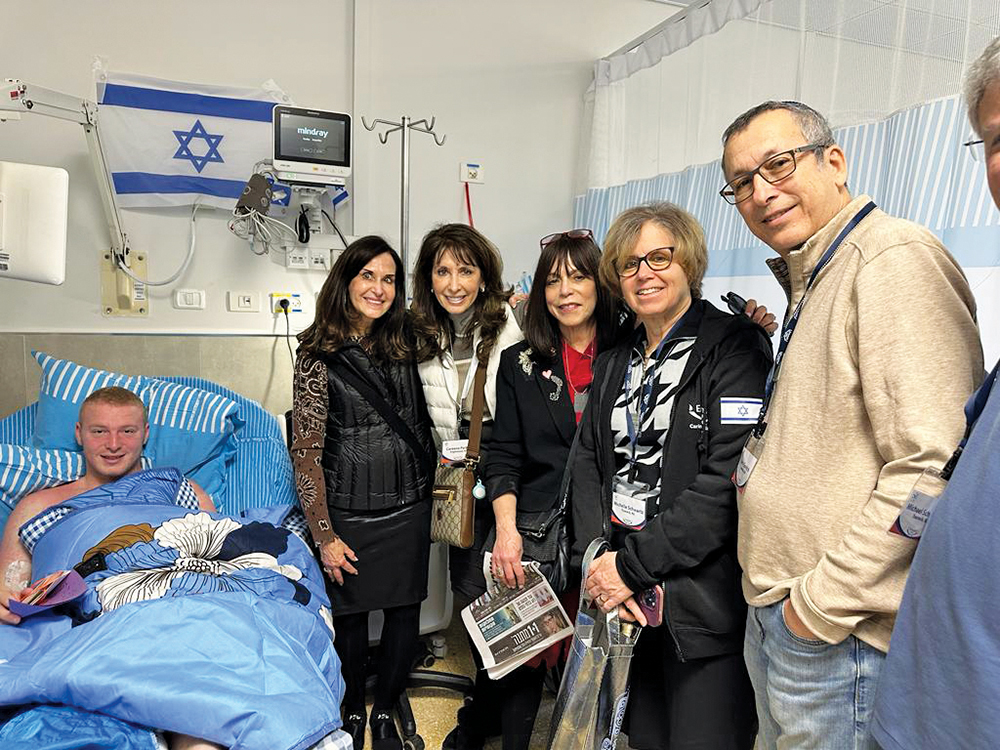
After saying prayers with Rabbi Perez, we continued to Neve Landy Children’s Home in Even Shmuel, situated less than 25 kilometers from Gaza. This facility is one of Emunah’s five residential homes throughout Israel. This home is for boys at risk who have been placed there by social services. They receive a diverse and much-needed range of intensive therapeutic interventions. As a result of their proximity to Gaza, at the start of the war, most of the boys had to return to their respective homes, which wasn’t ideal. They have since returned, and it was wonderful to see how well the boys were flourishing there. It was incredibly heartwarming to sense the love that the staff showers these children with so that they can one day become fully functioning members of society. We brought the boys a large assortment of gifts, which they were really delighted to receive.
It was already nightfall, and our next stop was a barbecue for the IDF Caracal Tank Battalion, a female-only unit located in the South along the border. When this group of young Israeli women soldiers were awoken at 6:30 a.m. on October 7, they had no idea they would be making history as the first all-female tank crews in Israel, and perhaps the world, to participate in an active battle. Their tanks were the first to arrive north to defend Ofakim against hundreds of terrorists. They killed scores of the invaders without suffering any losses. Their successes were transmitted worldwide.
It was befitting that Emunah would honor these very brave female heroines of Israel. It was a great evening—we ate, we danced, we sang, and we gave them cards we had collected from children in the States. We met the awe-inspiring commander of the battalion, a 34-year-old mother of three young children, who had the total respect and admiration of her unit, as did we. I asked several of the soldiers who fought on October 7 if they were ever afraid, and unflappably they responded, “No, this was what we trained for.” We left there inspired that Israel is in good hands.
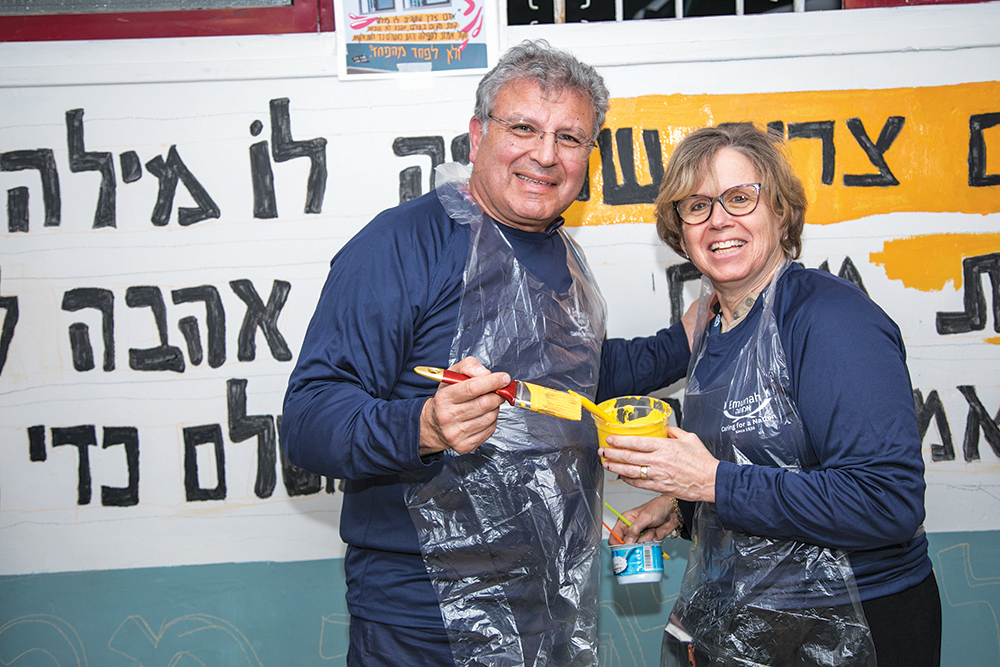
Day 3: Our first stop on the third day was Sderot, just a few kilometers from the Gaza border. On the way, we made a brief stop at a medical depot to drop off supplies that we had collected and had brought over with us from the U.S. for the soldiers. They appreciated tremendously the much-needed supplies. We then continued onward to Sderot. Last year, as part of the Bat Mitzvah Mission I was on, I visited Sderot for the first time. The beautiful impression of a very bustling city that was left on me came crashing down as I saw something different this time as we pulled in. I was terribly saddened by the emptiness, a city nearly totally devoid of its people.
At the site that was once the Sderot Police Station, we had the honor of meeting with and being addressed by Yair Avinoam, a symbol of courage of the Sderot Police Force. On October 7, while responding and defending against the horrific attacks that lasted there more than two days, Yair’s instinctive actions and heroism saved two very young children trapped for hours in a car after their parents were killed as they innocently drove past the terrorist-occupied police station. His testimony was so characteristic of countless heroes across Israel, who do what they do with a resolve and a steadfast spirit that defines them and their deep connection to the nation.
From the roof of the local Hesder Yeshiva, in the not-so-far distance, you could see the dark skies over Gaza and hear the continuous bombing and shelling taking place. Our visit to Sderot was but a preamble to what was yet to come.
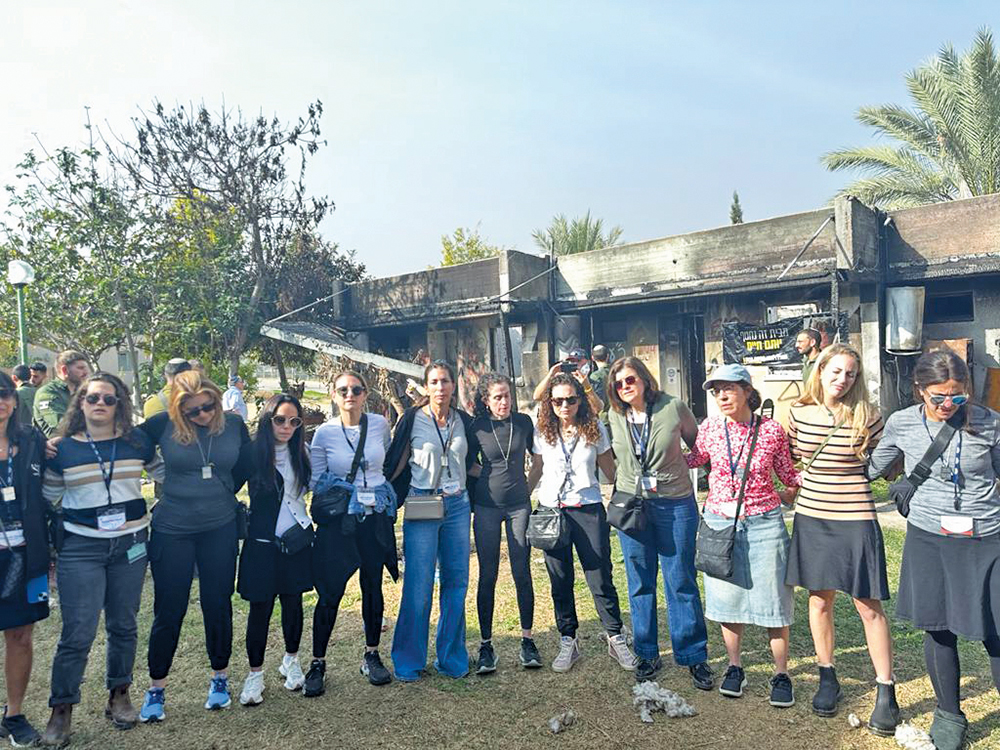
Kfar Aza is a kibbutz located less than a mile from the Gaza border, where the horror of Hamas’ infiltration led to the brutal massacre of scores of innocent Israeli families right in their homes and the abduction of others. I had tried to mentally prepare myself for what I was about to see, but I was still shocked and at a loss for words to describe it. What was once a vibrant community within a paradise setting now resonated with a lingering silence of trauma and tragedy.
We had the privilege of hearing from Ofer Winner, a pillar of strength from Kfar Aza. Ofer is not only a survivor of the tragic events of October 7 but also a father who experienced his own personal loss. His son, Yahav, heroically sacrificed his life to protect his wife, Shay-Lee, and daughter, Shaya.
Alongside Ofer was his bother-in-law, Miki Rosenfeld, who is also a survivor of the October 7 attacks and has suffered unimaginable loss. Miki’s daughter, Hadar, and son-in-law, Itay, were in their home when they saw the terrorists approaching. They hid their 10-month-old twin boys in a closet before they were brutally murdered. The babies cried for many hours before they could be rescued by Israeli soldiers.
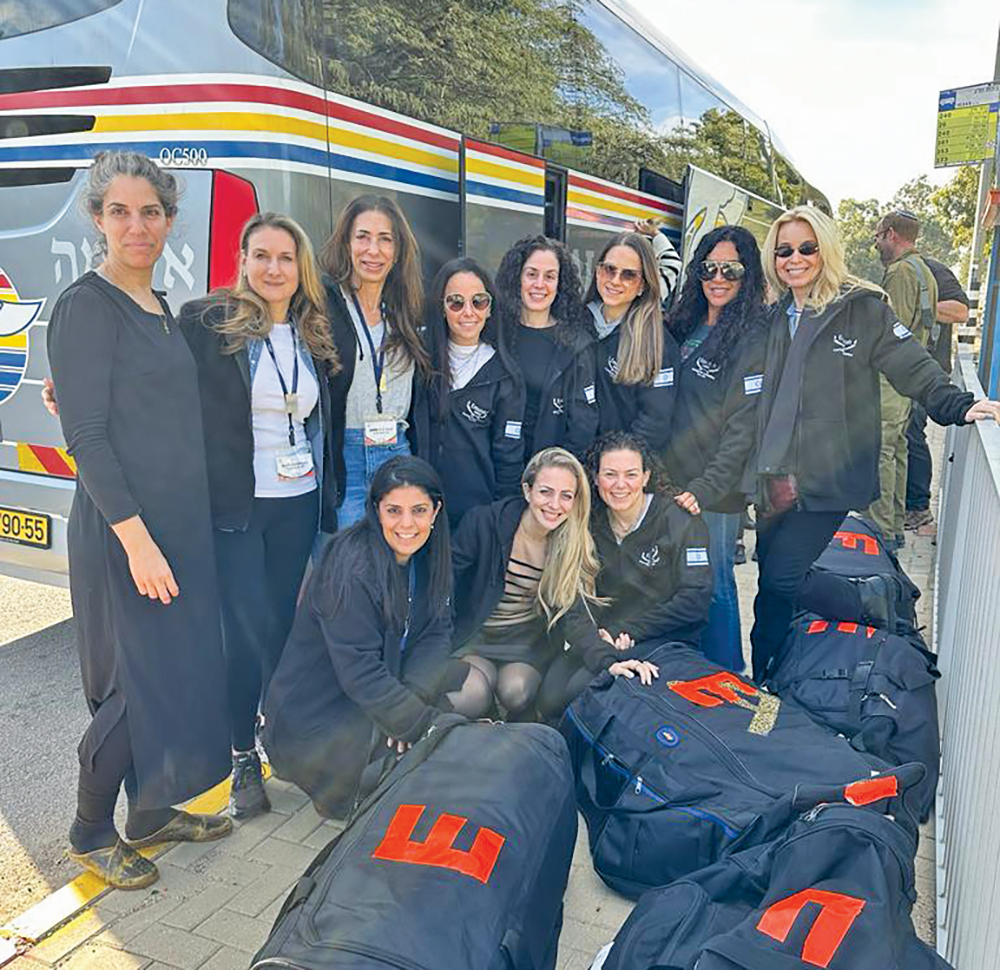
As Ofer began to take us around the kibbutz, he described his living in Kfar Aza as “95% heaven and 5% hell [from rockets].” You see very little of the damage until you get further in, but then suddenly you come upon it. The devastation we witnessed was just indescribable. They say a picture is worth a thousand words, but even the pictures cannot adequately deliver the message of all that I saw with my own eyes and heard with my own ears. As we toured the many burnt-out homes left in total ruin, it was heartbreaking to come to grips with the loss of life and the many abductions that accompanied it.
We made our way to Kibbutz Be’eri not too far from Kfar Aza. This kibbutz also suffered massive destruction and loss of life resulting from Hamas’ infiltration on October 7. There, we met with Adi Efrat, who miraculously survived a near-abduction. She was saved by arriving IDF soldiers just as she was about to be taken away. She took us on a tour of the devastation suffered by the kibbutz and shared with us some of the brutal details of the many who burned to death trapped in their burning homes. Those who emerged who were not murdered were abducted. She showed us a family member’s burnt-out home and recounted her own horror story of how she came face-to-face with the terrorists. I asked how she could escape her horrors if she is always recounting the story to the many visitors who come. She answered me that the people that died in the Holocaust didn’t have a voice. She said she needed to be a voice for her friends and neighbors who lost their lives here in a most brutal fashion. And of course, she believed she owed it to those abducted to keep their story front and center.
We left the South with heavy hearts and headed to Emunah’s Achuzat Sarah in Bnei Brak, an oasis in the middle of a crowded city. It is a supportive, therapeutic residence housing more than 100 children, aged 8-18, who were removed from their dysfunctional family environments by the court. Like Neve Landy, it is the goal of Emunah’s Achuzat Sarah to break the cycle of family distress by employing unique therapeutic and educational programs of intervention, tailor-made to meet the needs of each individual child.
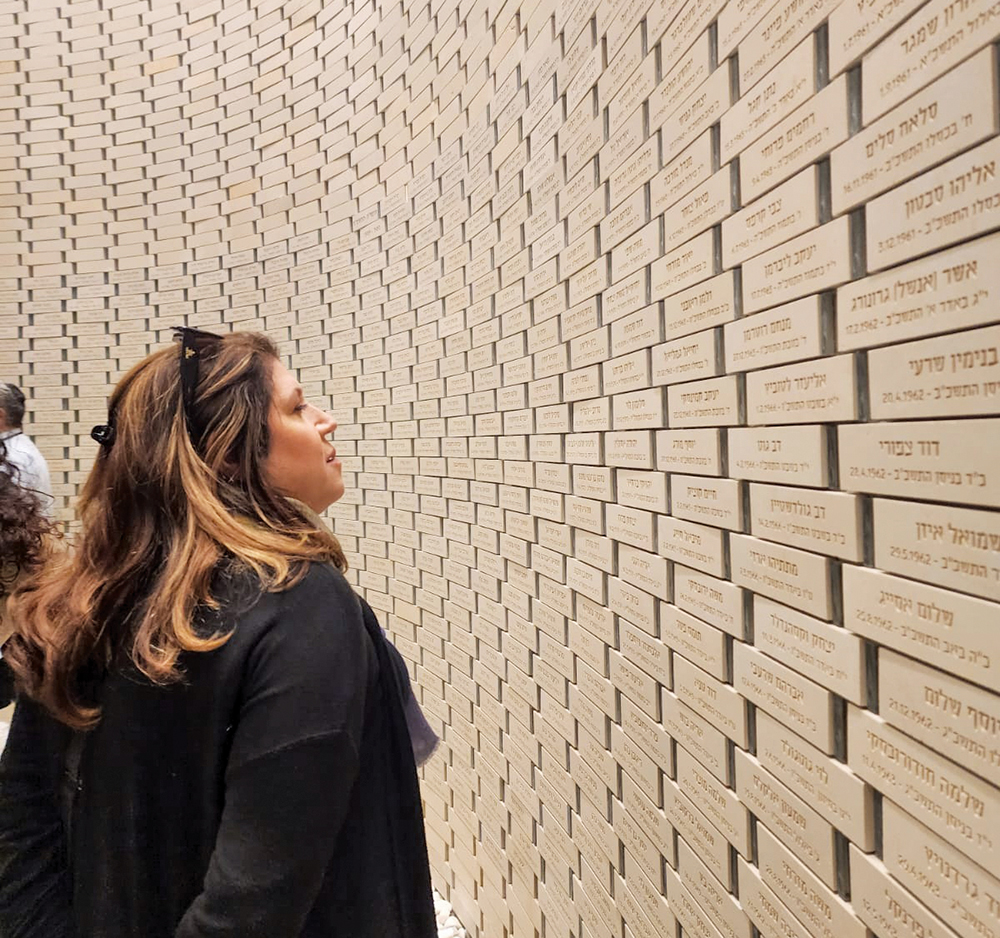
I had been to this home several times on earlier trips, and I had never failed to feel the incredible warmth of the dedicated staff immediately upon my arrival, and today was no exception. It is uplifting to see how much support the children receive and how successful Achuzat Sarah has been at helping them navigate their psychological challenges towards finding their better selves. Our mission participants showered the children with brand-new gifts collected in America. We left with a lasting impression after working together with many of the children in painting a portion of a beautiful new mural project they had been diligently working on. It is these types of transformative programs that empower these children with essential everyday living acumen, while fostering creativity and entrepreneurial skills that promise them a brighter future. The day culminated there with a heartwarming dinner, forging unforgettable bonds with the children and the staff of the home.
Our next stop was to the Nova Festival exhibit in Tel Aviv, an eerie recreation of the festival. All the items in the exhibit were brought from the field—a pileup of burned cars that lined the escape roads. Many tables displayed abandoned piles of shoes, glasses, clothing and accessories; all strangely reminiscent of exhibits from another tragedy of Jewish history of the not-too-distant past. Also on exhibit are the portable bathrooms that were riddled with bullet holes, testifying to the extent the terrorists went to kill any Jew who was hiding. There were places throughout the exhibit hall where people could express in writing their personal sentiments and pour out their own grief. It was an immensely powerful display that managed to bring out my grief at the loss of so many young, peace-loving, innocent souls whose only crime was being in the wrong place at the wrong time.
Our final stop for the day was at the Hostage Square, also in Tel Aviv. The Kikar HaḤatufim has many exhibits paying tribute to the hostages but become famous for its properly set “Shabbat Table,” complete with 240 empty chairs around it, each representing an abducted hostage. This exhibit has been copied in one form or another in many places around the world. The obvious message is to keep the hostages front and center continuously in all our minds, with the predominant aim of gaining their speedy release.
Day 4: We started off our last day with a powerful and informative briefing from Dr. Cochav Elkayam-Levy, an expert on international law, human rights and feminist theories. She established the Civil Commission on the October 7 Hamas atrocities, which represents Israel’s Women’s Rights Movement before the U.N. She is an acknowledged expert in the field of women’s rights who is waging a lonely battle seeking justice from an antisemitic U.N. body that shamelessly portrays no interest in a fight where only Jews are the victims. Cochav is a dedicated warrior and is quite determined to bring about positive change.
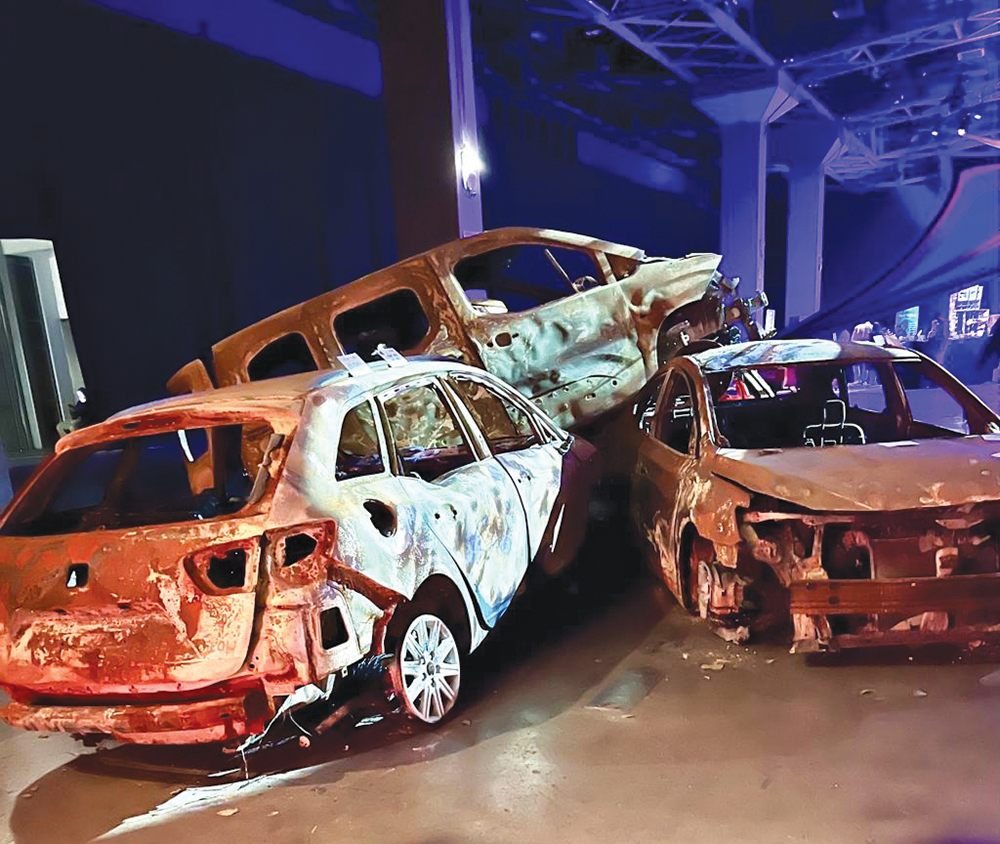
We then made our way to visit Telem, an Emunah partner organization that is dedicated to helping young women who were either victims of abuse or were estranged from their Charedi families for different reasons. Rabbi Bnayahu Dvir, who heads the program, along with his staff, has created a nurturing and safe environment in the form of a school that helps invigorate and bring purpose back to these young women’s lives. We met with many of Telem’s delightful students and participated in a very meaningful student-led Challah Bake. The challahs we baked were distributed later to IDF soldiers. Each of the young women we met had her own personal story of misfortune, and, with the help of Telem and its training programs, was able to summon up the courage to overcome her youthful adversity and develop a new and productive adult lifestyle.
The group split up to two where some went to a shiva home of a soldier, and some of us helped make Beef Jerky for the army. About 20 of us got straight to work either lining up the meat, drying it, slicing it, weighing it, bagging it, vacuum-sealing it, packaging it, and labeling it. Done, and off to the soldiers! You would be amazed how much Beef Jerky 20 motivated volunteers can produce in a few hours. Because Beef Jerky is an important source of protein that can remain fresh in a soldier’s backpack unrefrigerated for up to three weeks, it becomes instantly clear why it is such an important staple in the active soldier’s diet.
We ended our final night with a visit to Emunah’s College of Art and Technology. The art students showed us around a gallery of their new and very impressive art portraying the pain, trauma and strength of the nation since the October 7 attacks. The mission’s farewell dinner followed the exhibit where many of us had the opportunity to reflect on the overwhelming experiences of the four days we spent together.
After the mission, my husband and I stayed for a few more days with the intention of building on to the mission’s theme of supporting our brethren in Israel. We chose to volunteer in an egg processing plant up North which was struggling to process 200,000 eggs per day with only a skeleton crew. In a matter of 4 ½ hours, we helped process and package 95,000 eggs. We thanked the manager for the opportunity, but it was he who exhibited tremendous gratitude to us for trekking so far north to assist him. He shared with us that most people volunteer in Central Israel and towards the South. Unfortunately, his chicken farm’s location, just a few kilometers from the Lebanese border, certainly wasn’t helping his cause at this time.
We had missed the opportunity that others had during the mission to pay a shiva visit to the family of a fallen soldier. Unfortunately, opportunities arose post-mission for us to make two such visits on our own.
One soldier whose family we visited was Alexander Shpits, a 41-year-old reservist of Karmiel. Although his age exempted him from being called up at the start of the war, he immediately grabbed his equipment and went to fight with the men of his unit whom he had mentored. He was admired by his unit and was killed attempting to save a wounded soldier. Another fallen soldier whose family we visited was Orel Bashan, a 20-year-old from a suburb of Haifa. He was a star in his unit, always inspiring his comrades in arms with his positive outlook on life. As a result, he was always a tremendous morale booster to all who had the privilege to fight alongside him. He possessed a level of maturity well beyond his years. Yehei Zichram Baruch.
What impressed me the most about the itinerary Emunah put together was how our days always began with an event of emotional difficulty but ended on an emotional high. While there was so much to absorb through the heartbreaking, emotional moments of the trip, there were also very moving times of being uplifted and inspired, all of which made this trip so remarkable and meaningful. We experienced a recurring theme of resilience of the human spirit, the impact of unity, and the value of solidarity. While all these emotions were very pervasive, to a major extent the overhanging cloud remains the fate of the hostages. While time keeps moving and each morning brings a new day, life won’t truly move forward until the hostages are home.

Just as the generations of women have been before us, today’s Emunah women are heeding the call to help care for Israel’s most vulnerable population. During this most devastating time, Emunah programs are helping children and families process unimaginable trauma as a path to healing. With the existing crisis, Emunah has positioned itself well to take on the resulting increasing need for therapy and support services. Emunah is determined to ensure that Israel’s children and their families have the tools they need to heal, and through Emunah, women in America and throughout the free world are doing their part to strengthen and heal our Jewish nation.
When speaking with people in Israel, there is a sense of “we will prevail” and “we will rebuild.” I may have returned to the States, but I have left a part of myself in Israel. A moment does not pass where my thoughts are not with the families of the hostages, the fallen soldiers, and with those defending us on the front lines. I pray for an end to this war and for the safe return of all the hostages. I also pray that through our collective trauma, we become a stronger and more loving nation as well.
B’yachad N’Natzeach! Together We Will Prevail!








